From Bubsy to System Shock, how indie devs bring old videogames back to life
The trials and tribulations of tracking down the rights to dead games and giving them another shot.

Stephen Kick was in a sizzling jungle in Guatemala, a thunderstorm raging outside of his hostel, when he confronted a very familiar gamer anger.
"I thought, 'This is the perfect opportunity to play System Shock 2.' I tried to boot it up, and couldn't get past the installer," he remembers. "I managed to use the satellite internet to get to GOG.com and I thought, 'Oh they must have this, it's one of the greatest games of all time.' But it wasn't there."
System Shock—a shoe-in hall of fame franchise—was tied up with a benign insurance company in the midwest.
Kick was in the middle of a year-long sojourn through Mexico and Central America, fresh after leaving his job at Sony Online Entertainment where he designed characters for MMOs. The experience left him burned out, and Kick resolved to rehabilitate himself in the ways he knew how. Throughout his expedition into the jungle, he carried with him a trusty laptop loaded up with a litany of PC classics—Full Throttle, Fallout 1, Grim Fandango—the stuff that inspired him to join the industry as a kid. A night in the wilderness with System Shock 2 was supposed to reignite his dwindling passion for game development. It did accomplish that, though not in the way he expected.
Incensed that he couldn't actually play the game, Kick went down a rabbit hole of internet sleuthing to discover that the rights to System Shock—a shoe-in hall of fame franchise—was tied up with a benign insurance company in the midwest. Yes, from the Von Braun to Star Insurance.
"They had defaulted on some of their loans. We didn't discover til much later that the trademark went to Electronic Arts and the IP itself went to Star Insurance," explains Kick. "So I reached out to the contact form on the website, and I said, 'Hey it's my understanding that you own the IP for this game. Do you have any plans for it? What can I do to make this happen?"

That email was fortuitous. in 2013, Kick oversaw the re-release of System Shock 2, which became the flagship product for the newly formed Nightdive Studios. The company was founded by Kick as a way to track down the ill-fated rights of classic franchises in PC gaming. This industry is old enough and hazardous enough that spare intellectual properties are like pennies lost deep in couch cushions—you can find them, as long as you know where to look.
Since its founding, Nightdive has breathed life back into Tex Murphy, Turok: Dinosaur Hunter, The 7th Guest, and the entire Humongous Entertainment catalogue with re-releases, and has also produced new editions of cult-classic '90s FPSes like Blood and Forsaken. Some of these deals are arranged through licensing agreements. Sometimes Nightdive just buy the rights altogether. Their target audience is people just like Kick: Proud obsessives with a unique appreciation for all the apocryphal weirdness throughout PC gaming history. It is no surprise that Nightdive will be ringing in 2020 with a new original endeavor—a total remastering of the first System Shock, featuring all new graphics and some smart quality-of-life improvements.
The biggest gaming news, reviews and hardware deals
Keep up to date with the most important stories and the best deals, as picked by the PC Gamer team.
For Kick, it's just another chapter of the aficionado fantasy he's been living for the past seven years.
Everyone has a pet franchise that they grew up loving for some inexplicable adolescent reason, and we've all watched in horror as our old favorites are scrubbed from the archives.
"One of my favorite stories is when we went to go find the rights to I Have No Mouth And I Must Scream. That led me to Harlan Ellison's agent," continues Kick. "Two hours later my phone rings from an unlisted phone number. I pick it up, and just, 'Stephen! This is Harlan Ellison!' My blood turns cold. I'm like, 'Oh shit, what have I done?' [He gave me] the story about what went on with [the rights] and that he has a garage full of old copies of the game. … It was very special for us to bring that out and for him to see people appreciate it again."
That euphoria has become a binding force for indie developers around the world. Everyone has a pet franchise that they grew up loving for some inexplicable adolescent reason, and we've all watched in horror as our old favorites are scrubbed from the archives due to Chapter 9 chicanery, gross mismanagement, or flat-out cultural indifference. (I, for instance, spent a whole lot of time in my youth playing Glover for reasons that will escape me for the rest of my life.)
It's both a dream come true, and a personal grudge-fueled reckoning of the canon, to bring those bygone franchises back into the fold. Nightdive is the best-known savior of old games today, but it's definitely not alone.

Indie resurrections
Reviving old brands can earn such a lot of hate. It can be really dangerous. It can also be very profitable.
Dennis Blumenthal
Choice Provisions, of Bit.trip fame, just released their take on the chronically abused Bubsy franchise with Bubsy: Paws on Fire.
Greg Johnson, who told me that he never acquiesced the ToeJam & Earl license, put out the shockingly competent ToeJam & Earl: Back in the Groove earlier this year.
Chris Jones has done the same with our current Tex Murphy renaissance, and a small German collective called Assemble licensed the Leisure Suit Larry name from Codemasters for their 2018 take on the franchise: Leisure Suit Larry: Wet Dreams Don't Dry.
And then there are the true homecomings, like Jordan Weisman and Mitch Gitelman's Harebrained Schemes. The company lifts up Weisman's original tabletop creations, like Shadowrun and Battletech, which have spent the past decade-plus stuck in Microsoft limbo. Eventually, the two settled on some licensing deals, which, in Gitelman's words, has allowed him to pay penance for the 2007 Shadowrun arena shooter that was met with near-universal derision from fans.
But these licensing agreements often come with some serious qualifications. When Harebrained Schemes landed BattleTech, it was under the specific orders that they couldn't make a "real-time" mech game.
"[Microsoft] has to protect their IP. There's always going to be someone in Microsoft that says, 'I'm ready to make a new MechWarrior game.' And it never happens, it never gets close to being greenlit, but there's always someone sniffing around it," says Gitelman. "So the idea is just, 'We'll keep this for us, but you guys are great shepards for the IP, so we'll throw you this bone.' I don't mean that as negatively as it sounds."

Of course, the ignoble fates of some of these franchises make their fan-bases themselves extremely sensitive. (I mean, just think of the things that have happened to poor Bubsy over the years.) The best example of this might be Leisure Suit Larry, one of the most important mascots in the history of interactive entertainment, and also one who has been saddled with absolute dreck since the end of the adventure game era. Dennis Blumenthal, the marketing manager of Assemble and one of the heralds of Larry Laffer's reboot, learned that there is no easy way to satisfy a fanbase who's been through the ringer.
The team redrew our crusty protagonist into a younger, slightly-less-schlubby, slightly-less-'70s silhouette, and immediately weathered a typhoon of bereaved Al Lowe-disciples. Today, Blumenthal says the team is "way more cautious" when taking on an old, dead franchise.
"I worked with Calypso on Tropico 3 back in the day, so I have a little experience reviving brands, and it's always a rollercoaster to how fans react," says Blumenthal. "It's a great opportunity. I totally understand why so many publishers are not willing to take the risks of reviving old brands, because it can earn such a lot of hate. It can be really dangerous. It can also be very profitable."
The chance to right old wrongs, and recapture an ancient franchise in order and reupholster it for good, remains the primary draw. Dant Rambo, a producer at Choice Provisions, told me he secured the Bubsy license over a simple Twitter DM, and reiterates that anything is possible when you can borrow the rights to a semi-iconic character after a single push notification.
I asked why a development team that has secured such a strong bulwark of fans with the Bit.trip games would want to take a swing at a character that's beat-up as much as Bubsy. He had the same answer I would if I suddenly found myself in charge of Glover today.

"I’ve always had a soft spot in my heart for Bubsy. I rented the original game constantly as a kid, in part because I liked it and in part because I absolutely could not beat it. It’s a very nostalgic series for me and I’m only just slightly embarrassed to admit how cool it is to me that I got to work on a Bubsy game," he says. "There’s also something about the longevity of the character that amuses me to no end. He has his fair share of earnest fans, but there are also people out there who seem baffled as to how he’s remained in the zeitgeist all these years. I love that we found a way to be a part of that."
This is the guiding light for Stephen Kick, as well. Nightdive exists as an eternal tribute to the entries in PC gaming folklore that might not necessarily be great, but certainly deserve to be recognized nonetheless. Some of his favorite resuscitations are oddballs like Bad Mojo, a truly bizarre Windows 95 odyssey that features a cockroach attempting to reclaim his human soul. You have to be a very specific age, and of a very specific disposition, to demand Bad Mojo on modern machines.
Thankfully, people like Kick have a native understanding of those needs. As long as they're around, the right deals are slowly but surely being made.
"I grew up without consoles. I played a lot of weird stuff on the PC. I have the opportunity to go out and find the rights for these games and ensure that other people [can] get weirded out like I did," he says. "I realize that Bad Mojo didn't sell a million copies when it first came out, and it doesn't have a rabid fanbase, but I did it because I love that game. … One of the guiding philosophies of Nightdive is that regardless of what the game is, it deserves to be back out there."

Luke Winkie is a freelance journalist and contributor to many publications, including PC Gamer, The New York Times, Gawker, Slate, and Mel Magazine. In between bouts of writing about Hearthstone, World of Warcraft and Twitch culture here on PC Gamer, Luke also publishes the newsletter On Posting. As a self-described "chronic poster," Luke has "spent hours deep-scrolling through surreptitious Likes tabs to uncover the root of intra-publication beef and broken down quote-tweet animosity like it’s Super Bowl tape." When he graduated from journalism school, he had no idea how bad it was going to get.
Most Popular

